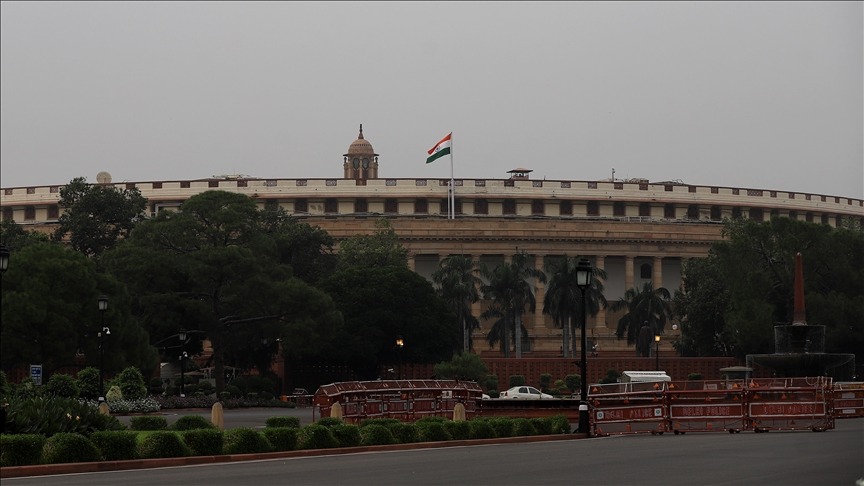Jharkhand fourth state to adopt law after West Bengal, Rajasthan, Manipur.
NEW DELHI (AA) – Parveen Shaista has spent more than two years grieving her husband who was killed by a mob of radical Hindus in the eastern state of Jharkhand.
Shaista is relieved that a strict law is being implemented to punish those who brutally lynch innocent people.
The lynching of her husband was not an isolated murder as several similar events have been reported across the country in the past decade and the nation saw a steep rise in mob violence targeting the minority Muslim community after the Hindu nationalist Bhartiya Janata Party (BJP) rose to power in 2014.
She is the wife of Tabrez Ansari, who was brutally attacked by a mob on June 17, 2019, in Dhatkidih.
He was a Muslim and was forced by his attackers to chant the Hindu religious slogan: “Jai Shri Ram,” or “Hail Lord Ram.” The mob tied him to an electric pole and beat him on suspicion of theft.
Police, who arrived the morning after the overnight attack, arrested Ansari, who was a victim, instead of taking action against the assailants.
Ansari, 24, was not provided medical help, died five days later on June 22.
The couple was married less than two months when Ansari was targeted by zealot Hindus.
“I have the hope that finally, I will get justice. It would have been better had the government made the law to hang the culprits and compensate the affected people so that they could lead their future life without hardship,” Shahista told Anadolu Agency.
The BJP party was in power when Tabrez was lynched and Raghubar Das was Jharkhand’s Chief Minister.
in December 2019, BJP lost the assembly elections and a regional party, Jharkhand Mukti Morcha (JMM), came to power and Hemant Soren became chief minister.
– Lynching results in public outrage
The Jharkhand assembly cleared the Prevention of Mob Violence and Mob Lynching Bill, 2021 on Dec. 21 that provides prison terms ranging from three years to life and fines of up to 2.5 million rupees ($35,000) for those involved in mob lynching that leads to “injury or death.”
Chief Minister Hemant Soren said the government was forced to bring the law after BJP came to power and destroyed the social fabric of the country.
“It is not a Hindu, Muslim, or Adivasi (tribal) act because a mob is simply a mob. We were forced to enact the legislation after the BJP came to power and created an atmosphere which ruined the social fabric of the country,” Soren said after the bill was passed.
The bill has been sent to the state’s governor for his signature. Once notified, Jharkhand will become the fourth state to bring such a law after West Bengal, Rajasthan, and Manipur.
Incidentally, the four states are not ruled by the BJP. This is significant because BJP leaders have often been accused of helping the accused who are involved in mob lynching.
But before Ansari was killed, many more were mob-lynched in Jharkhand. Most were hate crimes where someone or a group was attacked simply for belonging to a particular religion.
Jharkhand-based lawyer and activist Mohammed Shadab Ansari said it is important that implementing agencies do their work honestly.
“It is important that the police and other authorities investigate these cases properly, otherwise it is not easy to punish the accused,” he told Anadolu Agency. “Those killed are poor and it is not easy to get justice for them. In Jharkhand, the government has changed but the attitude of the police has not changed, it should be changed only then the law is beneficial.”
There is no official data available regarding the number of people killed by mob lynchings in India.
But critics said in the years since Narendra Modi took power in 2014, there has been a steep rise in hate crimes.
Mobs target, brutally assault, and sometimes kill innocent people, mostly Muslims, according to activists.
According to the Union Home Ministry, between 2014 and March 3, 2018, 45 people were killed in 40 cases of mob lynching in nine states. And at least 217 people were arrested.
Details on the motive, whether cow vigilantism, communal or caste hatred or rumors of child-lifting, location of the attack, identities of the attacker and victims, were not available.
According to officials, the National Crime Records Bureau (NCRB) does not maintain data concerning lynching incidents in the country.

